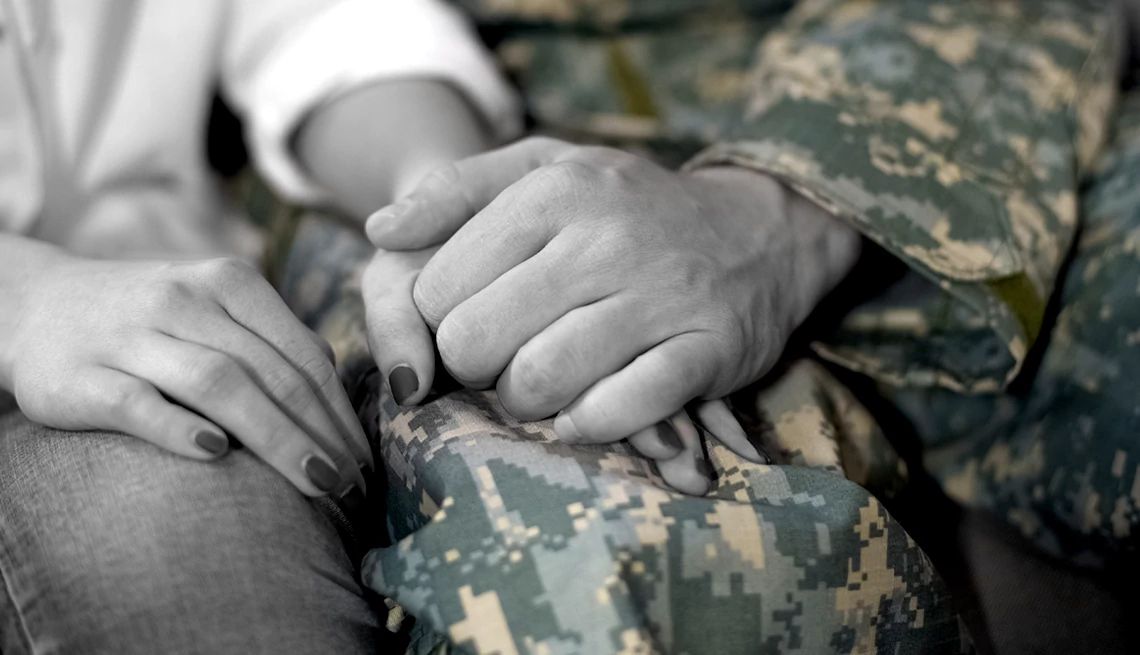Play all audios:
Steve was called up after Sept. 11 and deployed in 2005 to Iraq, where he was hit in the back of the neck with mortar fragments and was conditioned to simply “shake it off.” When he came
home on leave, he began having trouble sleeping, experiencing problems with headaches and vision, fatigue, weight loss and confusion. With three young children at home, he continued his job
as a firefighter, while Mary was teaching school. She began to notice changes; he would blow up at the kids, and sometimes she would find him hiding under blankets and talking about “people
in black.” He failed a cognitive test and finally his co-workers told her he was having anger issues, which led to the loss of his job. “Over time, I was done,” says Mary. “Our children
were older, and they had developed so many issues — drug use, cutting, attempted suicide. Steve’s moods were so bad I couldn’t tell him any of this. While our son was being arrested at home
for drug use, he was in the living room changing channels, totally checked out. Steve didn’t understand what was happening.” “How do we provide emotional support to caregivers who deal with
cognitive disorders?” Mary wonders. “I don’t want anyone to tell me to put the damn oxygen mask on. I miss the relationship with the person I married. It’s such a fine line between
expressing what I need and upsetting the apple cart and having to deal with the consequence of what I need.” THE IMPOSSIBILITY OF SELF-CARE Katie Wilson*, 50, from Richmond, Virginia, met
her husband Bill* when they were both in the military. He’d survived a penetrating shrapnel injury to the skull while in Iraq when they started dating, but thought he was functioning OK.
She could see Bill was drinking more than he should, experiencing nightmares and letting bills go past due, but she was in love. After they married and lived together, it became obvious that
he needed more care. “People weren’t prepared to handle brain injuries back in 2003,” Katie recalls. “I decided not to re-enlist in the Army so that I could help him, and I’ve spent our
marriage focusing lots of energy on him: appointments, care, managing his deep depression, erratic moods, rage, and suicidality. An AARP study found that 49 percent of veteran caregivers
under age 60 spend more than 20 hours providing care each week. “I knew I couldn’t be his wife _and_ his mother, and I was planning to divorce him before he agreed to give up alcohol, get on
a mood stabilizer and let me take over the finances due to his reckless spending,” explains Katie. “But once some of the pressure was taken off me, I realized, _I am not OK_. I’m exhausted
and have been functioning by compartmentalization and dissociation, constantly crouched against the possibility that something will happen. The police have been to our house more than once
for violent outbursts.” At one point, Bill put a gun to her head; another time, took her phone, locked her in the basement, and sent horrible messages out through her social media account.
“Interpersonal violence in caregiving situations is something we don’t talk about,” Katie says. “I carry the chronic trauma of walking on eggshells, always worried that if I don’t do the
right thing it will set him off. And if I’m not hypervigilant, he will die by suicide. Bill’s risk for early dementia due to injury sits inside me all the time. It’s the anxiety about the
future; what can we do and what are we going to do?” Bill and Katie have tried couples therapy without much success. Katie recently quit her job to give herself the space to invest in her
own well-being. “I need to spend time on myself first,” she says, “and then maybe couples counseling would be more productive. With enough therapy, hopefully I can let go some of the anger
and grief about what my life might have been like.”

